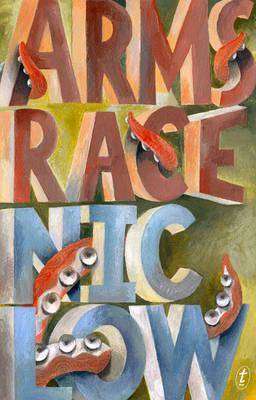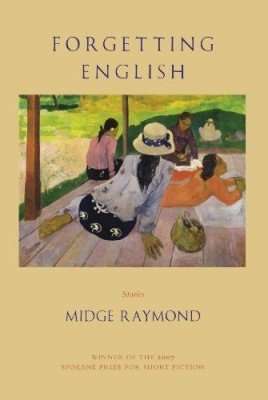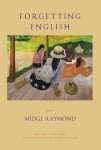Arms Race by Nic Low & Forgetting English by Midge Raymond reviewed
The holiday season has been the perfect opportunity for me to read a couple of short story collections that I’ve had on my wish list for ages, Nic Low’s Arms Race and Midge Raymond’s Forgetting English.

Arms Race, and Other Stories Synopsis
Data theft, internet memes, advertising, terrorism, indigenous sovereignty, drone warfare, opium addiction, syphilis, the moon landing, mining, oil slicks, climate change, giant octopuses: nothing is spared in this collection. Nic Low’s stories go beyond satire, aiming for the dark heart of our collective obsession with technology, power and image.
Set variously in London, an Indian village, remote Mongolia, the West Australian outback and mountainous New Zealand, these are prescient visions of the future and outlandish reimaginings of the past. Arms Race is an arresting debut from a fierce, playful new voice in Australian writing.
Disclosure: If you click a link in this post we may earn a small commission to help offset our running costs.
Sign up to our Booklover Book Reviews emails and receive our gift for new subscribers. LEARN MORE >>
BOOK REVIEW
Not every book lover connects with the short story format. I think Alec Patric described this beautifully in our interview with him after his first long-form novel publication Black Rock White City was shortlisted for the Miles Franklin Award:
Alec: I’ve come to think that short stories and novellas are part of a different scene to the novel. There’s crossover of course, but the analogy I’d use now is that there’s theatre and there’s cinema. Both have many of the same principles of an audience and performance, but there are also fundamental differences in how they are received by the wider culture.
I always admire the precision and control displayed by authors skilled in the short story format, but the stories that most excite me and linger longest in my memory are those that offer readers a new slant on or cleverly exploit a peculiarity of human behaviour.
Nic Low’s Arms Race, and Other Stories is a diverse and highly thought-provoking collection.
It is no surprise to me that one of my favourite titles, the satirical Rush was shortlisted for the 2012 Commonwealth Short Story Prize – a wonderful example of turning societal norms on their head, skillfully exposing their inherent bias.
The sergeant shakes his head. What’s your point? he says. What are your demands?
No demands Toff says. This isn’t a protest action. You know what they say – if you can’t beat ’em? He smiles and shrugs. Now we’re a real-deal mining company.
The sergeant stares at him, and for the first time in his life, Toff feels the sweet righteousness of bureaucracy rising up in him.
Of the twelve (12) stories in the collection, I particularly enjoyed those that highlight the power marketing and selective communication has in our society, how technology amplifies that and the audiences’ willingness to accept easy-to-digest (albeit often morally corrupt) versions of reality — Arms Race, Slick, Photocopy Planet, Facebook Redux, Data Furnace and Culler. In addition to cleverly executed ideas and Low’s pitch-perfect balance of humour and humanity, core to the appeal and success of these alternate histories/realities are their strong links to the here and now, their plausibility.
Rare is it that I feel compelled to give a special mention to more than half of the stories within a short story collection – clear indication of the exceptionally high quality of Nic Low’s Arms Race, and Other Stories. Highly recommended to those new to short fiction.
BOOK RATING: The Story 4.5 / 5 ; The Writing 4.5 / 5
 Get your copy of Arms Race from:
Get your copy of Arms Race from:
Booktopia(Aus) | Amazon
Genre: Short Story, Literature, Drama, Humour
This review counts toward my participation in the Aussie Author Challenge 2017.
About the Author, Nic Low
Nic Low is an author and artist of Ngai Tahu and European descent. Born in Christchurch, he now divides his time between Melbourne and a bush retreat near Castlemaine. Nic’s fiction, essays and criticism have appeared in the Big Issue, Monthly, Griffith REVIEW, Lifted Brow, Art Monthly and Australian Book Review, and until recently he ran Asialink’s international writing program. His second book, a literary exploration of New Zealand’s Southern Alps, will be published by Text in 2016.
- Shortlisted for the Readings Prize for New Australian Fiction, 2015 and the Queensland Literary Awards, USQ Australian Short Story Collection—Steele Rudd Award, 2015
- In this interview with the Wheeler Centre, Nic Low talks about loving the undo button, talking writing with Alex Miller, raising our kids on a diet of stories, and accidentally writing activist literature.
♦

Forgetting English Synopsis :
Winner of the 2007 Spokane Prize for Short Fiction
Forgetting English explores the indelible imprint of home upon identity and the ways in which new frontiers both defy and confirm it.
From a biologist navigating the icy moonscape of Antarctica to a businesswoman seeking refuge in the South Pacific, the characters who inhabit these stories travel for business and for pleasure, out of duty and in search of freedom, and each comes face-to-face with the unexpected.
(Amazon)
BOOK REVIEW
Midge Raymond’s debut novel My Last Continent was one of my Top 10 International Reads of 2016. That the quality of her prose struck me from the opening line, and hearing her speak so candidly and eloquently about her writing motivations at the 2016 Brisbane Writers Festival, guaranteed I would seek out her short fiction.
The eight (8) stories within this Forgetting English collection published almost a decade ago are highly character-driven. The focus is often less about what the characters actually do, but relationships and their inner responses to the actions of others. From Translation Memory,
… even as the sweat trickles down his back, he had to admire the culture of economy – in Japan everything is scarce: resources, space, time. Through working with Saito and his other accounts, he had come to appreciate Japanese efficiency. He wonders, as he tastes salt on his lips, whether the withdrawal of affection between himself and Julie is perhaps not likewise a matter of economising – not a falling away of love but a storage of energy for the future.
With story settings crossing the globe the underlying message of Raymond’s collection is the universal nature of the human experience and acceptance of our inherent weaknesses.
While I found the sadness, isolation and detachment of some her characters less personally relatable, I know these stories will hold great appeal to many readers (4.2 Goodreads rating). What I took away from this collection is continued admiration for the subtlety and quiet control of Raymond’s prose.
BOOK RATING: The Story 3 / 5 ; The Writing 4 / 5
 Available from:
Available from:
Amazon
Genre: Short Story, Literature, Drama
Reading update: We have also now read Midge Raymond’s 2024 novel Floreana.
About the Author, Midge Raymond
Midge Raymond is the author of the novel My Last Continent and the award-winning short-story collection Forgetting English. Her writing has appeared in TriQuarterly, American Literary Review, Bellevue Literary Review, the Los Angeles Times magazine, Poets & Writers, and many other publications.
Midge worked in publishing in New York before moving to Boston, where she taught communication writing at Boston University for six years. She has taught creative writing at Boston’s Grub Street Writers, Seattle’s Richard Hugo House, and San Diego Writers, Ink. She has also published two books for writers, Everyday Writing and Everyday Book Marketing. Midge lives in the Pacific Northwest, where she is co-founder of the boutique publisher Ashland Creek Press.
